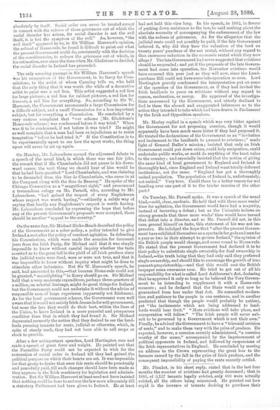After a few unimportant speeches, Lord Hartington rose and made
a speech of great force and weight. He pointed out that the Parnellite Party could not be expected to wish for the restoration of social order in Ireland till they had gained the political purpose on which their hearts are set. It was impossible for that group to desire that even fair rents should be punctually and peacefully paid, till such changes should have been made as they approve in the Irish machinery for legislation and adminis- tration. But Sir William Harcourt at least need not have insisted that nothing could be done to enforce the law more adequately till a statutory Parliament had been given to Ireland. He at least had not held this view long. In his speech, in 1882, in favour of putting down resistance to the law, he said nothing about the absolute necessity of accompanying the enforcement of the law with the redress of grievances. As for the allegation that the judicial rents could not possibly be paid, if the late Government believed it, why did they base the valuation of the land on twenty years' purchase of the net rental, without any regard to that enormona reduction in the economic rental which they now allege P The late Government had never suggested that evictions should be suspended ; and yet if the proposals of the late Govern- ment had come into operation, the November evictions would have occurred this year just as they will now, since the Land- purchase Bill could not have come into operation so soon. Lord Hartington gravely condemned the interpretation put on some of the speeches of the Government, as if they had invited the Irish landlords to press on evictions without any regard to. reason, moderation, or mercy. He approved of the investiga- tions announced by the Government, and utterly declined to• find in them the absurd and exaggerated inferences as to the action they intended to take which had been drawn in Parliament by the Irish and Opposition speakers.


































 Previous page
Previous page